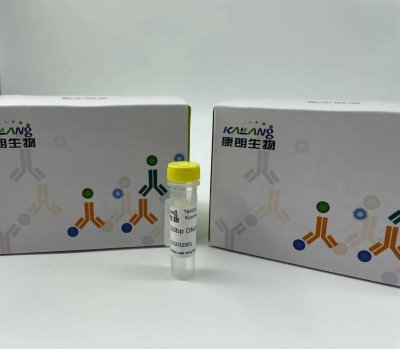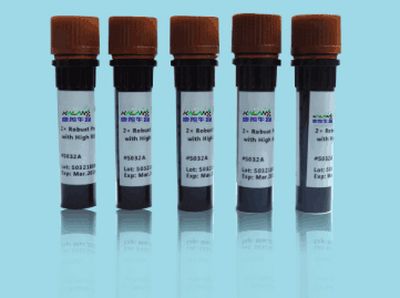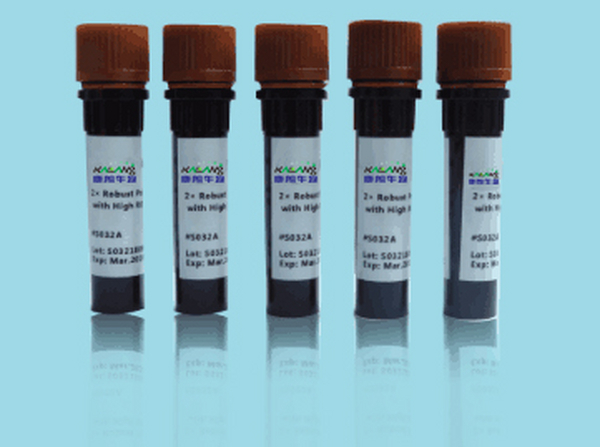QQ:3002763590


客服电话:021-61998208
PEX13 rabbit Polyclonal Antibody
PEX13抗体
PEX13抗体应用:WB 1:500-2000 ELISA 1:5000-20000peroxisomal biogenesis factor 13(PEX13) Homo sapiens This gene encodes a peroxisomal membrane protein that binds the type 1 peroxisomal targeting signal receptor via a SH3 domain located in the cytoplasm. Mutations and deficiencies in peroxisomal protein importing and peroxisome assembly lead to peroxisomal biogenesis disorders, an example of which is Zellweger syndrome. [provided by RefSeq, Oct 2008],
PEX16 rabbit Polyclonal Antibody
PEX16抗体
PEX16抗体应用:WB 1:500-2000 ELISA 1:5000-20000peroxisomal biogenesis factor 16(PEX16) Homo sapiens The protein encoded by this gene is an integral peroxisomal membrane protein. An inactivating nonsense mutation localized to this gene was observed in a patient with Zellweger syndrome of the complementation group CGD/CG9. Expression of this gene product morphologically and biochemically restores the formation of new peroxisomes, suggesting a role in peroxisome organization and biogenesis. Alternative splicing has been observed for this gene and two variants have been described. [provided by RefSeq, Jul 2008],
PEX6 rabbit Polyclonal Antibody
PEX6抗体
PEX6抗体应用:WB 1:500-2000 ELISA 1:5000-20000peroxisomal biogenesis factor 6(PEX6) Homo sapiens This gene encodes a member of the AAA (ATPases associated with diverse cellular activities) family of ATPases. This member is a predominantly cytoplasmic protein, which plays a direct role in peroxisomal protein import and is required for PTS1 (peroxisomal targeting signal 1, a C-terminal tripeptide of the sequence ser-lys-leu) receptor activity. Mutations in this gene cause peroxisome biogenesis disorders of complementation group 4 and complementation group 6. Several transcript variants encoding different isoforms have been found for this gene. [provided by RefSeq, Oct 2015],
PF2R rabbit Polyclonal Antibody
PF2R抗体
PF2R抗体应用:WB 1:500-2000 ELISA 1:5000-20000prostaglandin F receptor(PTGFR) Homo sapiens The protein encoded by this gene is member of the G-protein coupled receptor family. This protein is a receptor for prostaglandin F2-alpha (PGF2-alpha), which is known to be a potent luteolytic agent, and may also be involved in modulating intraocular pressure and smooth muscle contraction in uterus. Knockout studies in mice suggest that the interaction of PGF2-alpha with this receptor may initiate parturition in ovarian luteal cells and thus induce luteolysis. Two transcript variants encoding different isoforms have been found for this gene. [provided by RefSeq, Jul 2008],
PF4V rabbit Polyclonal Antibody
PF4V抗体
PF4V抗体应用:WB 1:500-2000 ELISA 1:5000-20000platelet factor 4 variant 1(PF4V1) Homo sapiens The protein encoded by this gene is a chemokine that is highly similar to platelet factor 4. The encoded protein displays a strong antiangiogenic function and is regulated by chemokine (C-X-C motif) receptor 3. This protein also impairs tumor growth and can protect against blood-retinal barrier breakdown in diabetes patients. [provided by RefSeq, Nov 2015],
PFD2 rabbit Polyclonal Antibody
PFD2抗体
PFD2抗体应用:WB 1:500-2000This gene encodes a member of the prefoldin beta subunit family. The encoded protein is one of six subunits of prefoldin, a molecular chaperone complex that binds and stabilizes newly synthesized polypeptides, thereby allowing them to fold correctly. The complex, consisting of two alpha and four beta subunits, forms a double beta barrel assembly with six protruding coiled-coils. [provided by RefSeq, Jul 2008],
PGCB rabbit Polyclonal Antibody
PGCB抗体
PGCB抗体应用:WB 1:500-2000 ELISA 1:5000-20000brevican(BCAN) Homo sapiens This gene encodes a member of the lectican family of chondroitin sulfate proteoglycans that is specifically expressed in the central nervous system. This protein is developmentally regulated and may function in the formation of the brain extracellular matrix. This protein is highly expressed in gliomas and may promote the growth and cell motility of brain tumor cells. Alternate splicing results in multiple transcript variants. [provided by RefSeq, Sep 2011],
PGDH rabbit Polyclonal Antibody
PGDH抗体
PGDH抗体应用:WB 1:500-2000 This gene encodes a member of the short-chain nonmetalloenzyme alcohol dehydrogenase protein family. The encoded enzyme is responsible for the metabolism of prostaglandins, which function in a variety of physiologic and cellular processes such as inflammation. Mutations in this gene result in primary autosomal recessive hypertrophic osteoarthropathy and cranioosteoarthropathy. Multiple transcript variants encoding different isoforms have been found for this gene. [provided by RefSeq, Mar 2009],
PGFRL rabbit Polyclonal Antibody
PGFRL抗体
PGFRL抗体应用:WB 1:500-2000 ELISA 1:5000-20000platelet derived growth factor receptor like(PDGFRL) Homo sapiens This gene encodes a protein with significant sequence similarity to the ligand binding domain of platelet-derived growth factor receptor beta. Mutations in this gene, or deletion of a chromosomal segment containing this gene, are associated with sporadic hepatocellular carcinomas, colorectal cancers, and non-small cell lung cancers. This suggests this gene product may function as a tumor suppressor. [provided by RefSeq, Jul 2008],
PGK2 rabbit Polyclonal Antibody
PGK2抗体
PGK2抗体应用:WB 1:500-2000 ELISA 1:5000-20000phosphoglycerate kinase 2(PGK2) Homo sapiens This gene is intronless, arose via retrotransposition of the phosphoglycerate kinase 1 gene, and is expressed specifically in the testis. Initially assumed to be a pseudogene, the encoded protein is actually a functional phosphoglycerate kinase that catalyzes the reversible conversion of 1,3-bisphosphoglycerate to 3-phosphoglycerate, during the Embden-Meyerhof-Parnas pathway of glycolysis, in the later stages of spermatogenesis.[provided by RefSeq, May 2010],
最新动态
-

Anti-GNGT1 KL20092-001(50ul)
2021-10-11 -

Anti-GNGT1 antibody(50ul) KL20093-001
2021-10-11 -

MUC5AC (PT2058) mouse Monoclonal Antibody
2021-01-06 -

mOrange mouse Monoclonal Antibody(Mix)
2021-01-05
热门标签
- Histone H3 rabbit Polyclonal Antibody Histone H3抗体
- EGFR rabbit Polyclonal Antibody EGFR抗体
- Cy3 Conjugated
- AbFluor™ 555 Conjugated
- AbFluor™ 680 Conjugated
- AbFluor™ 350 Conjugated
- AbFluor™ 647 Conjugated
- AbFluor™ 594 Conjugated
- AbFluor™ 405 Conjugated
- Cy5 Conjugated
- AbFluor™ 488 Conjugated
- Cyclophilin B抗体 Cyclophilin B Monoclonal Antibody(2B10)
- COX IV抗体 COX IV Monoclonal Antibody(6C8)
- PCNA抗体 PCNA Monoclonal Antibody(12D10)
- FAK rabbit Polyclonal Antibody FAK抗体
邮箱:3002763590@qq.com
电话:021-61998208

扫码关注微信公众号






